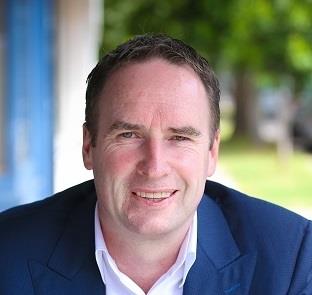answered
Q: I have a GST question. How is GST treated on a New Residential development? If an apartment is sold off the plan for $800k. Given there has been GST paid in the construction costs , does the developer still need to pay the GST?
A: Justin,
I'm no Accountant & he will be able to give a firm answer on that one, but from what I've seen, the developer will may GST on the sale of the properties, but claim back GST on the construction costs, ex council fees/contributions & anything else that is GST free).
Check it with your Accountant though and/or hopefully an Accountant will reply here to clarify (and correct me if I'm wrong).
answered
Q: Hi , trying to get an idea of what the going interest rate & max LVR is for Residential property developments circa $10-20m?
A: Correct Justin - the deposit would be held by the R/Est agent, just like a deposit on any normal purchase.
Probably also worthwhile getting your ducks in a row in terms of:-
1) Experience. It's towards the top of the list; and/or
2) Who will Project Manage. It's quite likely that the Bank will want a QS that is on their panel/they approve plus a Project Manager.
3) Experience/background of the builder/key contractors. The banks will want to know that they are capable.
4) Lump sum contract with a contingency built in.
5) What other income, outside of the sale of the properties (if that's the intent) is available to service the debt, as this will drive the required level of pre-sales. If the debt is to clear from the sale of the completed properties & there is no other income, aim to cover most or all of it covered from pre-sales.
Good luck.......
answered
Q: Hi , trying to get an idea of what the going interest rate & max LVR is for Residential property developments circa $10-20m?
A: Hi Justin,
This would be treated as a commercial transaction so you'd be paying commercial interest rates, which would depend upon the overall risk profile of the transaction, but could range anywhere from 5% - 7%.
Different financiers will have different measures, but we work on a maximum 75% LDCR (loan to development cost ratio) & 65% LVR (loan to valuation ratio).
Only other tip I'd give at this stage is if you will be securing pre-sales, ensure that the deposit is 10%, otherwise anything lower could be considered unqualified/may not be taken into account by the lender as the source of clearance.
Hope this helps........
answered
Q: How much equity do I need to have in my current home, for a bank to consider it as security towards buying a small investment property? We are on a very low, base income at the moment, and I would estimate our remaining mortgage represents about 20% of the property value.
A: Hi Shay,
As a rule of thumb & to avoid mortgage insurance, you should work towards having total equity in all properties combined of at least 20% as most lenders will lend up to 80% of the value of the property mortgaged so long as you can service the debt.
As an example, the easiest way to work out if you have the equity or not would be:-
Current debt $200
Proposed debt for investment property $300
Total debt $500
Market value of your existing house $400
Market value of investment property $300
Total market value $700
Maximum lend @ 80% = $560
And so long at the total debt is less than the maximum lend (which in this case it is, ie. debt $500 / maximum lend $560), you know you have sufficient equity.
As some of the other experts here say though, the primary concern of any financier is the ability to service the debt, but this is at least a start.......
Good luck.
answered
Q: I've been out of work for the past 9 months got very behind in my mortgage and so now that I am at preservation age I took 25K from my superannuation and paid off the mortgage debt. Today I got the bad news that I am unlikely to be able to work for at least another 6 months. I have only 13K of superannuation left. I took the 25K in late March. Can I access the remainder of my super? When? Thanks Deb
A: Hi Deb, I can't comment on when you can access your Super, but most banks have some kind of hardship support for cases such as yours which means you may not need to access you Super & they may be able to provide some form of relief.
I just Googled a few & found them pretty easily:-
https://www.westpac.com.au/about-westpac/sustainability/initiatives-for-you/customers-financial-hardship/
https://www.nab.com.au/personal/help-and-guidance/financial-hardship
https://www.commbank.com.au/about-us/who-we-are/customer-commitment/financial-hardship.html
http://www.anz.com/about-us/corporate-sustainability/microsite/anz-financial-hardship/
https://www.suncorp.com.au/banking/help-support/financial-difficulty.html
Hopefully this helps.
answered
Q: My husband and I are directors of our own construction company. We have reached a point where we are out of out depth with how to measure our progress and be able to see if our business is viable and our debts measureable and managable. We are lost as to what we should do next to get our debts under control. Should we seek advice from a financial planner?..and can't our bank manager help us with this planning?
A: Hi Clare, dependant upon the experience of your Banker, they may be able to provide guidance, but in the meantime, there are various easy to check measures you can use to check viability and debt capacity, including:-
- How many times your EBIT (NPBT + interest) can cover your interest cost. You should be targeting at least 1.5 - 2x. As an example, if your NPBT was $100 & your interest cost was $25, your EBIT would be $125 ($100 + $25) & your interest cover would be 5x ($125 / $25).
- The multiple of debt to your EBITD, which is EBIT + depreciation. It's a different target for different industries, but if you worked on say no greater than say 3x your EBITD, that's reasonable. Example is if EBITD is $250 you'd want your debt to be no greater than $750.
- Balance sheet equity should be at least 25%. That's simply net assets / total assets.
Over-riding all of this is watch your cash & in particular your debtors & make sure they pay when they are supposed to, as there have been plenty of good/profitable/growing businesses go broke because they've run out of cash.
Keep in mind that Net Profit is just a number on a page, tells you nothing about cash & if your debtors for example are growing, that's using up cash. Simple way of thinking of it is:-
- growth in assets uses cash
- reduction in assets generates cash
- growth in liabilities generates cash
- reduction in liabilities uses cash
Outside of all of this, I'd suggest if you are starting to face cashflow issues, you also talk to both your bank & creditors early. In cases like that, you can't communicate enough........
Good luck - hope it all works out for you..........
answered
Q: We are currently looking at a 4 bedroom home in Engadine for $940,000 and have $150,000 to cover deposit, stamp duty and legal fees. My husband’s income is income is $136,000 and I work permanent part time and earn about $67,000. We have 2 kids under 10….. no other debts and would like to know how much we might be able to borrow, thank you?
A: Hi Anne,
There are various online calculators which can help you work out your borrowing capacity & just one that I know of is (https://www.westpac.com.au/personal-banking/home-loans/calculator/mortgage-calculator/).
This will let you play with various different scenarios to see what works best for you.
Regardless of the outcome (ie, you might find you can borrow as much as you need), two tips I'd give include:-
1) If you are looking to borrow more than 80% of the purchase price of the property, you're looking at Mortgage Insurance & that's not cheap, so if you can avoid it, by either borrowing less (maybe you wait 6mths & save more? / extended settlement, etc) or if you have some other additional security you can offer your financier to get below 80%, it would save you plenty, as it's dead money.
2) There is a difference between a bank being willing to lend you the money & you being able to sleep at night knowing you all of a sudden you have gone from no debt (I assume) & plenty of disposable cash (again, I assume) to a large mortgage & a large commitment you'll need to meet each month.
It may well be that the rent you're paying now is the same as the loan repayment & if so, that's great, but just make sure your headspace is right when you make the decision, that's all.
Good luck
answered
Q: I have a business/app idea that would require capital to get it off the ground - what are the first steps go about funding and what would be needed on my end to ensure a positive outcome?
A: No problems Nicola. The only thing I would add is that it wouldn't hurt to have clearly defined & measurable targets that you can share with the financier, as well as a plan around what happens if they aren't achieved, that way everyone can measure progress & knows upfront what will happen if things don't turn out. Cheers
answered
Q: I have a business/app idea that would require capital to get it off the ground - what are the first steps go about funding and what would be needed on my end to ensure a positive outcome?
A: My pleasure Nicola. There is nothing stopping you from starting to talk to your financiers upfront/before you engage your external advisor, as they may have other ideas/requirements as well that I haven't thought of. I'd start with the branch where you Bank at the moment and/or engage the services of one of the Brokers here if you prefer & dependant upon the size of your proposal, they will likely introduce you to some form of Business Banker who you can start talking to. I'd be very upfront & acknowledge that this is a start-up proposal, with no history & you understand that they will want a lot of information/understanding to get comfortable with the risk, so you have/will (if you decide to) be using an independent consultant which will give the financier comfort. Don't take this the wrong way, but be prepared for this not to be easy given start-up/no history/you are asking for finance against what you think will happen, but with the right information & advise you never know..........
answered
Q: I have a business/app idea that would require capital to get it off the ground - what are the first steps go about funding and what would be needed on my end to ensure a positive outcome?
A: Hi Nicola, you'll need a really good & well researched business plan, that is supported by plenty of research that is really easy for any potential financier to understand, double check & quantify (ie, expect revenue of $x based upon a, b & c, same with costs, etc). Keep in mind that this won't be a request that a financier would see often & they will not have expertise in the industry, so it wouldn't hurt to have an external/independent party that a financier would find acceptable (ie, a high profile Accounting or Advisory firm) review your plan/forecasts & provide a report, which the financier could then rely upon. Be sure to highlight any potential risks & threats - too often people just tend to avoid this, but financier want to know - how you will manage/minimise them and what would happen in a worse case scenario. Good luck......
answered
Q: I own 50% of a house, the other partner wants to sell. I am looking at buying her share. The mortgage amount is $500,000 she is willing to sell the house at $350,000 because house prices have decreased. Can she sell the house at under the mortgage amount? Will the banks lend her the amount needed to cover her share of the decrease with no asset to show?
A: Hi Jane, any transaction will require both of your consent/signatures on various documents, ie. contracts, bank documents, etc, so nothing can happen unless you both agree. She will need to prove to the banks that she can service any residual debt she has & just as importantly, she will need to be able to offer the bank's some form of security unless they are prepared to provide some form of unsecured, personal loan, although by the sounds of it, it wont be a small amount, so she may struggle. Good luck..........
answered
Q: I am a Director of a growing small business and have a mutual agreement with my partner to buy him out at the end of this calendar year. It's a reasonably significant amount, so will need to borrow the money. What's the best way to go about this? Can I borrow the money through the business or do I do it personally? Both my personal and business financials are quite sound.
A: Hi Jarrod, you'd need to get some advise from your Accountant which way to approach it, although in general so long as the necessary security/guarantees are in place, your Bank should be able to structure the transaction anyway you like. As a guide, if you are likely to be in a position whereby you don't have sufficient property to secure the debt & need to borrow the funds against the business cashflow only, you would likely to be looking for the balance sheet of the business to show equity of around 30% after the extra debt is included & forecast EBIT interest cover (EBIT / forecast interest) to be at least 2x. Different Banks will have different benchmarks, but this will at least give you abit of a guide/method or working out where you need to be to get the deal done. Cheers.......
answered
Q: Parents are in their 70’s and have been given advice about using their home to borrow money. What’s the difference between a reverse mortgage and an equity release loan?
A: Hi Peter, you'll probably find that a reverse mortgage starts with a lower LVR, ie. say 50% of the house value or a maximum amount & interest can capitalise, ie. add to the loan, whereas an equity loan would be at closer to standard LVRs, ie. 80% & they will need to cover the interest monthly. I'd suggest the debt servicing may be treated differently as well & I can't be sure but you might find that the reverse mortgage interest rate is higher. Cheers
answered
Q: Can I use my SMSF to invest funds into my own business?
A: Hi Megan, best to check with your Accountant/financial advisor but there are regulations around using SMSF funds to invest/loan to related entities. I'm no expert, nor am I a qualified financial planner, but if memory serves me correctly, it's something like the SMSF can't invest/loan anymore than 20% (??) of it's total funds to a related party. If you keep Googling you'd probably find more on it as well. Cheers
answered
Q: I have two children about to start Private secondary school. We have been putting away money since they were born into a separate bank account and have around $80k. is there a better way that we can use this money - I have heard of education funds, but we have not explored. one idea was to buy an investment property with this money (and some top up) and effectively use some of the rental money to pay their school fees and then incur a debt for the fees against the growth in the property?
A: Hi Rohan,
Hopefully you've had the money in one of the 'bonus' type accounts, where you earn x% per month & if you make at least 1 deposit & no withdrawals during the month, you earn an extra y% ontop of the base rate (my children aren't as old as yours but I've been doing the same thing as you using this type of account since they were born).
I'm not advocating a call either way on the investment property as it may be something you just want to do, but some of the things to consider include:-
- How much of the $80 you have will go into buying costs? You wouldn't want to loose a third of what you've been saving over the last decade of more in 1 go.
- Will the net available rent be enough to make a material difference to the school fees? If we put it in context, if you allow say $25 in buying costs, that leaves you with $55 as your 20% deposit which will mean you can buy something worth say $275 & borrow say $220, unless you top it up as you suggest.
At a return of say 5%, rent would be say $14 p/a (in round numbers) less say $2 p/a for costs (not to mention any capital expenditure, ie. replace hot water system, aircon, etc), less interest on the debt of $11 (no principal), leaves $1 left over.
- What happens if it ends up vacant long term?
- Will the tax benefits be material enough to make a real difference?
- What will be your selling costs when the time comes?
Again, I'm not giving advise & this is only 1 option, but if you went out & bought $80 of decent blue chip shares that pay fully franked dividends, you'd be earning say 4.5% + the franking credit. That'd be a total of ~$5 p/a without the headache of worrying about tenants/the steady income stream/repairs & maintenance, etc.
Others will have other ideas & this is by no means the only option, but all I'm getting it is make sure you consider all options, including the pros & cons, as this is an important decision.
answered
Q: We want to borrow about $300,000 for renovations. Do we have to have a contract with a builder or can we manage the process ourselves?
A: Hi Justin, $300,000 is a decent amount so more than likely your bank will want a contract which protects both you & them from over-runs, although it also depends on your situation/value of house/how much you're looking to borrow, as you may be able to get away with just organising a line of credit that you can draw as & when you need, ie. if the house is worth say $1.5m now & your total borrowings including the extra $300,000 is only say $1m then a line of credit will probably work if you can show serviceability, but if you will be reliant upon the increased value after the renos to secure the increased loan, then you probably won't get as much flexibility. Cheers
answered
Q: I am thinking of fixing my home loan. I understand there can be breakage fees if you refinance during the period. What if I want to sell and buy another home do the breakage fees apply or is the loan transferable to the next property?
A: Hi Geoff, generally the loan is transferable - or portable - so long as the borrowers don't change (which they don't sound like they will in your case) & the loan to lending value (LVR) is still within the bank's parameters, ie. most commonly the loan should be no more than 80% of the market value of the property and/or new property in your case. If you find that there is a time lag between selling & buying, you generally have the option to put sufficient $$ on Term Deposit to secure the loan pending the new purchase, but you'd want to do the sums to compare break cost to difference between interest paid on loan less interest earnt on Term Deposit. Just check with your bank though to be 100% sure, although I suspect the majors at least should all be similar. Cheers........
answered
Q: I have reached my preservation age of 56 for my superannuation and am thinking of setting up one of those transition to retirement pensions. Will I have to pay tax on the amount I withdraw?
A: Hi Geoff, best to find a decent financial planner to talk this through as you want to make sure you get the right advise. Just ensure you use a brand-name financial planner, ie. AMP, BT, major banks, etc as they have strict protocols & are have the watch-dogs keeping an eye on them, rather than a no-namer.......
answered
Q: I’m trying to help one of my kids buy their first home and want to get some advice on the options available. Can I just be a guarantor or do I have to be on the loan with them and what else do I need to consider?
A: Hi Peter, it depends how you define 'help' & the reason you are helping, ie. if they don't have a deposit but has enough income to service the loan, you can just be a guarantor but that would mean giving a mortgage over a house that you own until they paid the loan to the required level or the value of the house went up to achieve the same outcome. Otherwise if they don't have enough income to service the loan, you may need to be joint borrower/owner, although banks don't really prefer that option as there are various consumer credit codes which need to be complied with & that also mean you need to get a legitimate benefit from the transaction. Often the easiest & cleanest way it if you give them an interest free loan - if you have the cash - to get them to where they need to be. Cheers.....
answered
Q: Just started my own business and interested in what some experts say is the best business advice they ever received?
A: Hi Megan, good luck with your new business. I agree there are plenty of answers to this, but as a couple of tips:-
- Cash is king.
- Be conscious of the impact of your decisions will have on your cash position.
- If you feel things aren't working about and/or you see issues coming, put your hand up early. You can't communicate enough in these cases.
- Balance sheets are important to banks.
- Keep track of your actual results to budget. If not up to scratch, work out why & is it an issue. If so, who needs to do what by when to fix it & what happens if it's not done.
- Profit is just a number & doesn't say anything about cash, ie. if profit if $100,000 but stock has gone up by $150,000 then your cash is potentially short $50,000 unless it's been funded.
- Keep on top of your debtors & don't let them treat you like a bank.
I could keep going but hopefully these help.
Good luck.....





